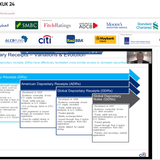Brazil’s interim President Michel Temer is looking to implement a reform package that will put the country on the path to economic recovery.
Full implementation of the reforms is unlikely to happen until the impeachment situation regarding Dilma Rousseff is resolved. Brazil’s Senate has now voted for Rousseff to stand trial.
“Once the impeachment situation is cleared up, there will be an opportunity in the remaining period of time to move forward the reform agenda,” said Eric Farnsworth, VP, Council of the Americas.
The reform agenda mainly consists of reining in spending, and according to Farnsworth, there has been talk of further austerity.
“Brazil has overspent, and Temer is trying to bring that under control. This has implications for interest rates, which need to be shifted, and other factors such as currency valuations.”
Temer’s aim is to restore the Brazilian economy through regaining competitiveness and re-attracting both foreign and local investment, which has been largely kept on hold – not just as a result of Rousseff’s impeachment proceeding, but because of the ‘car wash’ corruption scandal.
One of the key issues in need of addressing is the country’s pension system, and Temer is not the first politician to try to reform it.
“Pensions in Brazil are similar to what is known in the US as the ‘third rail’,” Farnsworth noted, a reference to the deadly rail between rail tracks that carries the electricity which will end the life, or in this case the career, of anyone who touches it.
“Politicians are aware that the pension system is bankrupting the country and that it is reducing the country’s competitiveness because highly skilled workers retire early. They know that it is a system that needs to be reformed, but they also know that it is incredibly politically difficult to do so.”
Although Temer is trying to restore some competitiveness and growth to Brazil’s economy, his lack of a mandate impedes his ability to fundamentally reform the country’s economy.
Nevertheless, green shoots are beginning to show in the Brazilian economy. The Brazilian government recently revised its GDP growth forecast up to 1.6% in 2017, up from a previous forecast of 1.2%. Inflation forecasts for next year remain unchanged at 4.8%. “We have seen growth over the last couple of months, and we are starting to hear more optimism from investors,” he said. However, the country would need fundamental economic reform for real change, which simply cannot be addressed in just a few years.
“In an economy that has been neglected for so long, at around 12 years, under Rousseff’s Worker’s Party’s dominance, it will take a long time to get going,” Farnsworth said, adding that a return to moderate growth would be an optimistic, but a plausible scenario in the medium-term.









